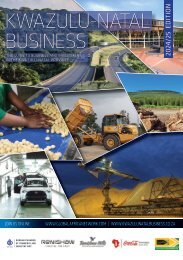KwaZulu-Natal Business 2016-17 edition
The 2016-17 edition of KwaZulu-Natal Business is the eighth issue of this highly successful publication that, since its launch in 2008, has established itself as the premier business and investment guide to the KwaZulu-Natal province in South Africa. The province is unique in terms of its abundant natural and human resources, and is also one of the key drivers behind the South African economy. To complement the extensive local, national and international distribution of the print edition of the magazine (15 000 copies), the full content can also be viewed online at www.kwazulunatalbusiness.co.za. Updated information on KwaZulu-Natal is also available through our monthly e-newsletter, which you can subscribe to online at www.globalafricanetwork.com, in addition to our other business-to-business titles that cover all nine provinces, complemented by our flagship publication, South African Business.
The 2016-17 edition of KwaZulu-Natal Business is the eighth issue of this highly successful publication that, since its launch in 2008, has established itself as the premier business and investment guide to the KwaZulu-Natal province in South Africa.
The province is unique in terms of its abundant natural and human resources, and is also one of the key drivers behind the South African economy.
To complement the extensive local, national and international distribution of the print edition of the magazine (15 000 copies), the full content can also be viewed online at www.kwazulunatalbusiness.co.za.
Updated information on KwaZulu-Natal is also available through our monthly e-newsletter, which you can subscribe to online at www.globalafricanetwork.com, in addition to our other business-to-business titles that cover all nine provinces, complemented by our flagship publication, South African Business.
Create successful ePaper yourself
Turn your PDF publications into a flip-book with our unique Google optimized e-Paper software.
OVERVIEW<br />
across the Big Four totalled R73.8-<br />
billion for the year, according to a<br />
survey done by PWC (Major Banks<br />
Analysis).<br />
Some of the figures published<br />
reflect the strain that consumers<br />
are feeling: credit impairments<br />
went up by 10.8% and nonperforming<br />
loans also grew.<br />
Competition is stiff in developing<br />
new strategies to incorporate<br />
the emerging second economy<br />
and the largely rural 'unbanked'<br />
communities. These new banking<br />
means and methods are developing<br />
the sector and giving it new<br />
flexibility, diversity and range.<br />
alBaraka Bank has its headquarters<br />
at Kingsmead in Durban,<br />
which is also the site of its corporate-banking<br />
division. HBZ Bank,<br />
a wholly owned subsidiary of<br />
Habib Bank and AG Zurich, operates<br />
an Islamic branch in Westville<br />
and has branches in Durban and<br />
Pietermaritzburg.<br />
In the sector catering to highnet-worth<br />
individuals, Nedbank<br />
has adopted a new strategy by<br />
combining BoE Private Clients<br />
(South African clients) and<br />
Fairbairn Private Bank (international<br />
clients). All of these clients<br />
are now be served by Nedbank<br />
Private Wealth.<br />
Absa's British investor, Barclays,<br />
has indicated it is aiming to sell its<br />
stake in African operations and financial<br />
services group Old Mutual<br />
(54% stakeholder in Nedbank)<br />
and has announced its plan to<br />
create four stand-alone businesses<br />
out of the Old Mutual Group.<br />
This would allow the UK-based<br />
wealth management business<br />
and the New York-based asset<br />
managers to be free of linkages<br />
to the rand, while the South African businesses (Nedbank and Old<br />
Mutual Emerging Markets) would be free to focus on their specialities.<br />
Project funding<br />
Merchant banking and investment banking are the most competitive<br />
sectors within banking. In <strong>KwaZulu</strong>-<strong>Natal</strong>, banks have been vital<br />
in getting really big infrastructure projects under way, a trend that is<br />
set to continue for some time to come, with provincial and national<br />
government committed to a comprehensive infrastructure upgrade.<br />
The European Investment Bank has extended a €50m long-term<br />
loan through Rand Merchant Bank to fund the massive water systems<br />
upgrade being undertaken by the eThekwini Municipality. The investment<br />
programme encompasses two new aqueducts and the replacement<br />
of 1 600km of old asbestos water mains.<br />
RMB was also involved in several Tongaat-Hulett and Richards Bay<br />
Coal Terminal projects, two major players in the provincial economy.<br />
Nedbank Capital supported Seacom’s R240-million undersea-cable<br />
project, and has signed a three-year funding agreement with healthcare<br />
group Netcare to the value of R1-billion.<br />
Absa’s public-sector division holds the provincial government banking<br />
account.<br />
The KZN Growth Fund is a project-finance facility supported<br />
by the <strong>KwaZulu</strong>-<strong>Natal</strong> Provincial Government, Standard Bank, the<br />
Development Bank of Southern Africa and the Infrastructure<br />
Corporation. The fund is capitalised to the extent of R5-billion.<br />
New customers, new technology<br />
Despite the incredible strides that have been made in providing banking<br />
services to the previously unbanked, there is still a long way to<br />
go. MasterCard, for example, has pointed out that only 2% of retail<br />
transactions on the continent of Africa are conducted electronically.<br />
The consulting firm McKinsey puts the figure for Africa's population<br />
not connected to formal banking at close to 80%: this presents an opportunity<br />
for South African banks in Africa. South Africa has the highest<br />
connection rate in Africa.<br />
Finscope's 2014 survey of South African banking and financial surveys<br />
shows that between 2004 and 2014 a remarkable eight-million people<br />
were connected to the financial system in some way. Overall, the<br />
'financially included' reached 31.4-million (up from <strong>17</strong>.7-million in 2004).<br />
In a category called 'formally served' which includes services other than<br />
formal banks with branch networks, the percentage of South Africans so<br />
served grew from 50% to 80%; in the 'banked' category (more traditional<br />
but including new devices), the percentage grew from 46% to 75%.<br />
91 KWAZULU-NATAL BUSINESS <strong>2016</strong>/<strong>17</strong>


















